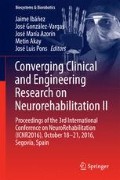Abstract
Electroencephalography (EEG) is an electrophysiological monitoring method to record the electrical activity of the brain in a not invasive manner, with low cost hardware, using wireless communication and with high temporal resolution. Serious Games (SG) have demonstrated their effectiveness as a therapeutic resource to deal with motor, sensory and cognitive disabilities. We have considered the combination of both techniques for attention assessment in children with cerebral palsy (CP). In this short paper we present a new approach for the development of a SG based on a Brain Computer Interface (BCI).
Access this chapter
Tax calculation will be finalised at checkout
Purchases are for personal use only
Notes
References
A. Nijholt, BCI for games: a ‘state of the art’ survey, in Entertainment Computing-ICEC 2008 (2009), pp. 225–228
P. Rego, P. Moreira, L. Reis, Serious games for rehabilitation: A survey and a classification towards a taxonomy, in 2010 5th Iberian Conference on Information Systems and Technologies (CISTI) (IEEE, 2010), pp. 1–6
J.J. Foxe, A.C. Snyder, The role of alpha-band brain oscillations as a sensory suppression mechanism during selective attention. Front. Psychol. 2(154), 2011 (2011). doi:10.3389/fpsyg.2011.00154
P. Putman, B. Verkuil, E. Arias-Garcia, I. Pantazi, C. van Schie, EEG theta/beta ratio as a potential biomarker for attentional control and resilience against deleterious effects of stress on attention. Cogn. Affect. Behav. Neurosci. 14(2), 782–791 (2014). doi: 10.3758/s13415-013-0238-7
M. Arns, C.K. Conners, H.C. Kraemer, A decade of EEG theta/beta ratio research in ADHD: a meta-analysis. J. Atten. Disord. 17(5), 374–383 (2011)
Acknowledgments
This work has been supported by the Spanish Government under project TIN2015-67149-C3-2-R and National Excellent Network DPI2015-69098. The EEG data processing has been done in cooperation with the enterprise Neuroelectrics, http://www.neuroelectrics.com.
Author information
Authors and Affiliations
Corresponding author
Editor information
Editors and Affiliations
Rights and permissions
Copyright information
© 2017 Springer International Publishing AG
About this paper
Cite this paper
Perales, F.J., Amengual, E. (2017). Combining EEG and Serious Games for Attention Assessment of Children with Cerebral Palsy. In: Ibáñez, J., González-Vargas, J., Azorín, J., Akay, M., Pons, J. (eds) Converging Clinical and Engineering Research on Neurorehabilitation II. Biosystems & Biorobotics, vol 15. Springer, Cham. https://doi.org/10.1007/978-3-319-46669-9_66
Download citation
DOI: https://doi.org/10.1007/978-3-319-46669-9_66
Published:
Publisher Name: Springer, Cham
Print ISBN: 978-3-319-46668-2
Online ISBN: 978-3-319-46669-9
eBook Packages: EngineeringEngineering (R0)

